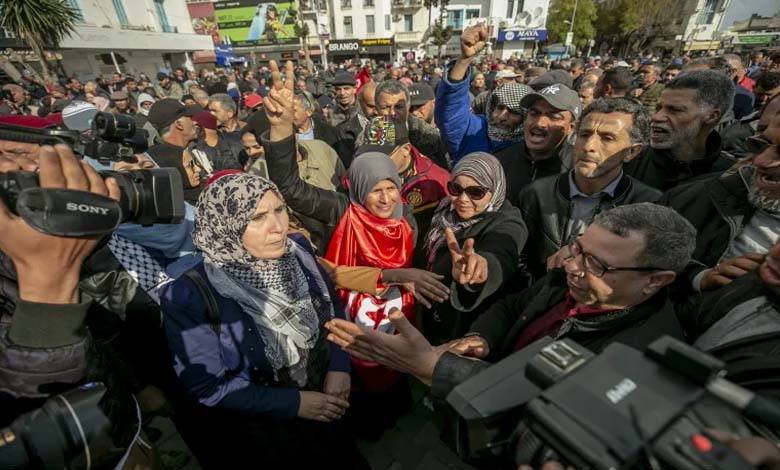Wherever They Go, They Bring Ruin: Tunisian President Accuses the Muslim Brotherhood of Fueling Gabès Protests

As residents of Tunisia’s Gabès province took to the streets demanding an end to their suffering from pollution and environmental suffocation, groups affiliated with the Muslim Brotherhood were reportedly operating behind the scenes to exploit public anger and channel it against the state.
-
As the election date approaches… Muslim Brotherhood in Tunisia intensifies efforts to disrupt
-
Who is Noureddine Bhiri, the mastermind of the Muslim Brotherhood in Tunisia, accused in the travel case after being sentenced?
Tunisian President Kais Saied explicitly referred to this, stating that “wherever the Brotherhood goes, ruin follows,” pointing to their repeated attempts to ride the wave of crises and exploit citizens’ pain for political gain.
He made the statement during a meeting with Prime Minister Sara Zaafrani, following a general strike held on Tuesday in Gabès to protest against pollution caused by the local chemical plant, according to a video released Wednesday by the Tunisian presidency.
Saied said he was “closely following the situation day and night, in Gabès and in many other cities,” describing the Brotherhood as “corruptors who bring nothing but destruction wherever they go.”
-
Saied is determined to eliminate the Muslim Brotherhood in Tunisia… Details
-
Its effects are no less than bombing Palestinian hospitals… Saied speaks about the corruption of the Brotherhood in Tunisia
He stressed that “the steadfast popular awareness and the unity of the people standing side by side with the security forces form the solid wall that will break all attempts to inflame the situation.”
The president added that “the Tunisian people continue to teach traitors and collaborators lesson after lesson; they will never succeed in assassinating the will of the people, who have raised the slogan ‘The people want’ and will achieve what they want,” as he put it.
Saied also criticized the neglect of equipment worth “billions” purchased in 2017 (during the Brotherhood’s rule) and left abandoned inside the Gabès chemical complex. He described those who sought to sell illusions and relinquish control of the complex as “mercenaries cast aside by history,” asserting that Tunisia “is not for sale or rent, and that there is no room for trading in the suffering of Tunisians.”
-
The Ennahdha Movement collapses… Crises hit the Muslim Brotherhood in Tunisia
-
Painful end for the Brotherhood in Tunisia… demands to dissolve Ennahdha movement after the arrest of Ghannouchi
He went on to denounce “the conspirators who used to meet in Bardo (the former seat of the Tunisian Parliament),” accusing them of “dividing roles and executing foreign agendas,” and emphasizing that such corrupt figures “bring only devastation with them.”
Saied continued, saying, “If Mohamed Daghbaji (a national resistance fighter from Gabès during French colonization) were alive today, he would stand alongside the people of Gabès with his historic courage and resilience to confront those conspiring against the Tunisian people. The sincere, steadfast, and rightful among them are resisting those who seek to exploit their suffering for their own known and exposed interests.”
The president confirmed that “the investigation is proceeding quickly, its results will soon be made public, and every official will bear full responsibility in accordance with the law.”
-
The leaders of the Brotherhood in Tunisia before the judiciary.. The start of the investigations of “Deportation of Terrorist”
-
After the failure of the Brotherhood in Tunisia.. Is Kais Saied ending the legacy of Ennahdha and its corruption?
The residents’ protests began about three weeks ago, following repeated cases of suffocation caused by emissions from the chemical plant. Local reports indicate that more than 100 people have been hospitalized in the province during September and October.
The chemical plant, established in 1972, is part of the Tunisian Chemical Group, a state-owned enterprise specializing in converting phosphate into phosphoric acid.
Between 1979 and 1985, two units were built to produce diammonium phosphate fertilizer, and in 1983, a plant for ammonium nitrate production was established.
This industrial complex is one of the largest in southern Tunisia, processing large quantities of phosphate extracted from neighboring Gafsa province to manufacture fertilizers and various chemical products.
-
Ghannouchi before the courts… Terrorism Surrounds the Head of the Brotherhood in Tunisia
-
Tunisia’s Muslim Brotherhood and The Forgotten Promise: Gabès Ignites Retroactively
-
The Tunisian Brotherhood and the Gabès Protests: Chaos to Undermine Public Anger
-
Tunisia: Imprisonment of a former presidential candidate rekindles debate over the Brotherhood’s influence on the judiciary












